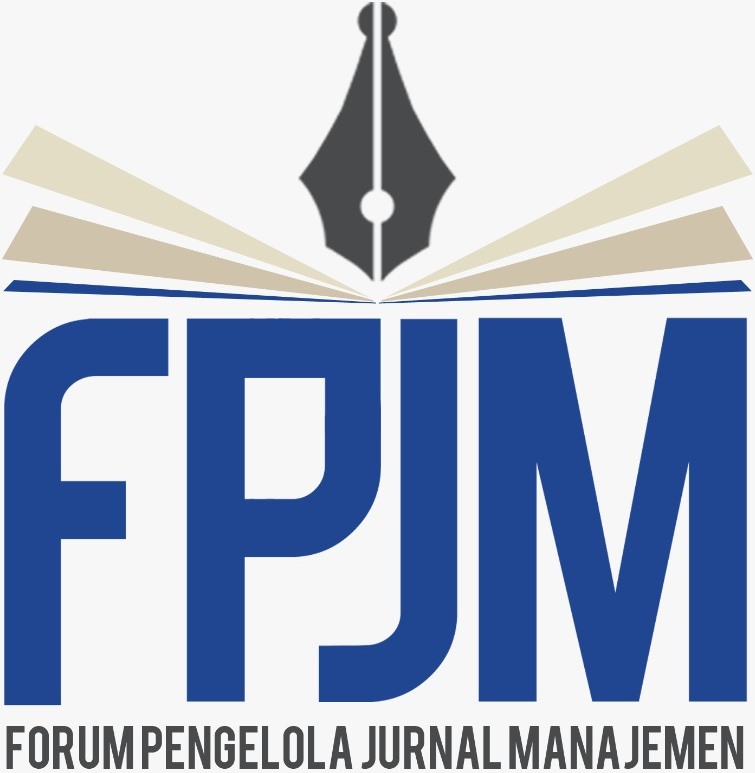ANALISIS FAKTOR-FAKTOR YANG MEMPENGARUHI TINGKAT PENGEMBALIAN PINJAMAN UMKM MITRA BINAAN PT ANTAM DI JABODETABEK
Abstract
The purpose of this study is to examine several factors that influence the level of CSR funds fostered by partners of PT Antam (Persero) Tbk in Jabodetabek. The sample of this study were 52 SMEs fostered by PT Antam (Persero) Tbk. Sampling is done by Probability sampling, with proportional random sampling technique. The data analysis method used is multiple linear regression. From the results of the study it was found that the size of the loan, sales turnover, business duration and business assets did not affect the rate of repayment of the loan while religiosity affect the rate of repayment of the loan. Thus, in order to achieve the level of repayment of MSME fostered partners of PT Antam (Persero) Tbk, PT Antam (Persero) Tbk must pay attention to the level of religiosity in providing loans to prospective fostered partners.
References
Anderson, B.S. and Eshima, Y. (2013). The influence of firm age and intangible resources on the relationship between entrepreneurial orientation and firm growth among Japanese SMEs. Journal of Business Venturing, Vol. 28 No. 3, pp. 413-429.
Anoraga, P. (2010). Ekonomi Islam kajian Makro dan Mikro. Yogyakarta: PT Dwi Chandra Wacana.
Djaddang, S., Lysandra, S. dan Mulyadi. (2018). Peran Entrepreneur-Orientation Terhadap Volatilitas UKM Dengan Budaya Lokal Sebagai Pemediasi, Jurnal Riset Bisnis Vol. 2 (1), 21-31.
Ghozali, I. (2016). Aplikasi Analisis Multivariete Dengan Program IBM SPSS 23, Edisi 8. Cetakan ke VIII. Semarang: Badan Penerbit Universitas Diponogoro
Lina Gozali et.al. (2017). Research Gap of Entrepreneurship, Innovation, Economic Development, Business Incubators Studies in Indonesia. International Journal of Economics and Financial Issues, 2017, 7(2), 243-248.
LPPI dan BI tahun (2015). Profil Bisnis UMKM.
McDaniel, S.W dan Burnett, J.J. (1990). Consumer Religiosity and Retail Store Evaluative Creteria. Journal of The Academy of Marketing Science. Vol. 18. No. 2. Pp. 101-112.
Mustikawati, R.I dan Walujeng, S. (2016). Religiusitas dan Kewirausahaan: Faktor Kritis dalam Mencapai Kinerja Bisnis pada UKM di Kabupaten Malang
Mason, C. and Brown, R. (2013). Creating Good Public Policy to Support High-growth Firms. Small Business Economics, Vol. 40 No. 2, pp. 211-225.
PER-05/MBU/2007 tanggal 27 April 2007 tentang program kemitraan badan usaha milik negara dengan usaha kecil dan program bina lingkungan.
Rahner, K. dan Vorgrimler, H. (1981). Dictionary of Theology. Second Edition. New York, USA: The Crossroad Publishing Company.
Rante, Y. (2010). Pengaruh Budaya Etnis dan Perilaku Kewirausahaan terhadap Kinerja Usaha Mikro Kecil Agribisnis di Provinsi Papua. Jurnal Manajemen dan Kewirausahaan, Vol. 12 No. 2: 133-144.
Sudaryanto dan Hanim, A. (2002). Evaluasi Kesiapan UKM Menyongsong Pasar Bebas Asean (AFTA): Analisis Perspektif dan Tinjauan Teoritis. Jurnal Ekonomi Akuntansi dan Manajemen, Vol 1 No 2, Desember 2002
Sugiyono. (2013). Metode Penelitian Kuantitatif, Kaualitatif dan R & D. Bandung: CV Alfabeta.
Sedyastuti, K. (2018). Analisis Pemberdayaan UMKM dan Peningkatan Daya Saing Dalam Kancah Pasar Global. INOBIS: Jurnal Inovasi Bisnis dan Manajemen Indonesia, Volume 2, Nomor 1, Desember 2018.
Simamora, B. (2002). Panduan Riset Perilaku UKM. Cetakan Pertama. Jakarta: PT.Gramedia Pustaka Utama.
Tambunan, T. (2012). Usaha Mikro Kecil dan Menengah di Indonesia: Isu-Isu Penting. Jakarta: LP3ES.
Undang-Undang Republik Indonesia No. 20 Tahun 2008 tentang Usaha Mikro Kecil Menengah (UMKM).
DOI: 10.34203/jimfe.v5i1.1276
Refbacks
- There are currently no refbacks.
Copyright (c) 2019 JIMFE (Jurnal Ilmiah Manajemen Fakultas Ekonomi)

This work is licensed under a Creative Commons Attribution-NonCommercial-ShareAlike 4.0 International License.











